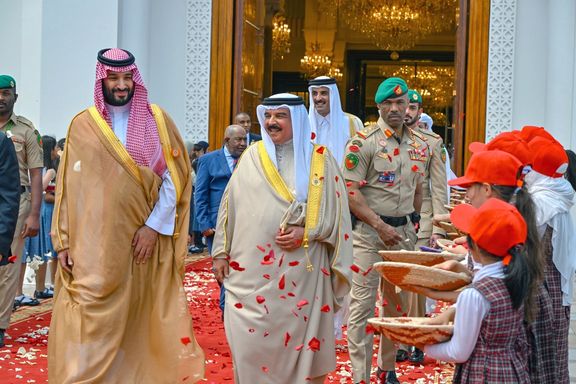US-Saudi Efforts Continue for Security and Nuclear Deal

US National Security Adviser Jake Sullivan and Saudi Crown Prince Mohammed bin Salman met in Dhahran to discuss a range of issues, including normalization of ties with Israel.

US National Security Adviser Jake Sullivan and Saudi Crown Prince Mohammed bin Salman met in Dhahran to discuss a range of issues, including normalization of ties with Israel.
This comes just days after two State Department officials met Iranian negotiators in Oman to discuss ways to prevent a further escalation of tensions and potential hostilities in the region.
A Saudi statement on Sunday also said, "the semi-final version of the draft strategic agreements between the two countries, which are almost being finalised,” were discussed.
The Biden administration is offering a strategic deal to the Saudis who have reasons to be wary of Washington’s perceived soft stance toward Tehran in the past three years. In addition to security guarantees, part of the deal appears to be an agreement to assist a Saudi civilian nuclear program, as Iran has reached the weapons threshold under President Joe Biden’s watch.
The de facto Saudi leader and President Joe Biden's top security aide also discussed the need to find a "credible track for bringing about the two-state solution" for Israel and the Palestinians, stop the war against Hamas militants in Gaza and facilitate the entry of humanitarian aid, the statement said.
Iran has repeatedly warned regional Arab countries against normalizing ties with Saudi Arabia. Last year, shortly before the Hamas attack on Israel, Iran’s Supreme Leader Ali Khamenei said on October 3,"The position of the Islamic Republic is that countries that make the gamble of normalization with Israel will lose. They are betting on a losing horse.” The comment came at a time when a final decision was made by Tehran’s Palestinian ally, Hamas, to launch the unprecedented attack that killed more than one thousand Israeli civilians. It is unlikely that Mr. Khamenei was not aware of the imminent attack.
Iran’s representative to the United Nations in New York confirmed the talks with US representatives, saying that “this was not the first or the last” round of talks. Observers believe that Biden has tried hard to prevent a region-wide escalation of the Israeli-Hamas conflict in an election year. Iran in the meantime has reiterated its support for Hamas and other armed militant groups in the region receiving financial and military support from Tehran.
US assistance to the Saudi nuclear program poses the question if Riyadh is willing to live with an Iran on the threshold of obtaining nuclear weapons, without pursuing a similar course to establish deterrence. In the past, Riyadh has not only reiterated its right to have full control over the nuclear cycle, but has threatened to develop atomic weapons if its security needs so dictate.
The Saudi crown prince has long said that if Iran developed a nuclear weapon, Saudi Arabia would follow suit, a stance that has fueled deep concern among arms control advocates and some U.S. lawmakers over a possible US-Saudi civil nuclear deal.
This leaves the possibility that a purely civilian Saudi nuclear program would be linked to US security guarantees, which in turn would mean some sort of détente or deterrence with Iran. Recently, Iranian officials have been threatening “a change in nuclear doctrine” if Israel threatens the country’s nuclear installations or the Islamic Republic regime itself. Currently, Tehran has accumulated sufficient fissile material for at least three nuclear warheads, and for the time being it seems interested to use the option as a leverage with Israel and the United States.